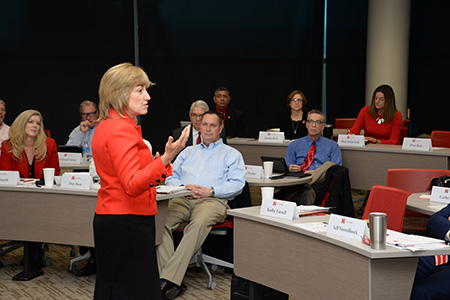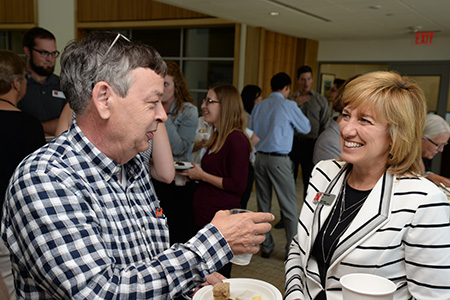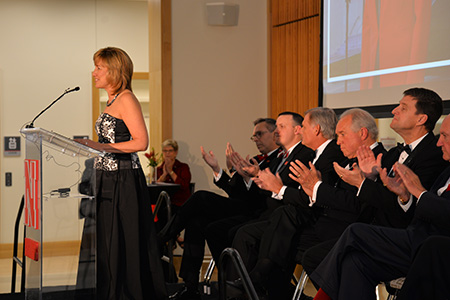After serving as the University of Nebraska–Lincoln College of Business interim dean for nearly a year, Dr. Kathy Farrell became the 10th dean of the College of Business in December. In her relatively short time leading the college, Farrell has immersed herself in the job. The college’s Communications, Marketing and External Relations (CMER) team recently checked in with her to learn more about her and her thoughts on her new role and the future of the college.
CMER: In your eyes, what makes the Nebraska College of Business stand out?
Dean Farrell: We have many programs of distinction and we have faculty and staff that are committed to taking the college to the next level of excellence. There seems to be a positive outlook on our future and a commitment to help elevate what we are doing for our constituents.
 Farrell facilitates strategic planning with the Deans Advisory Board.
Farrell facilitates strategic planning with the Deans Advisory Board.
What will be your initial priority as dean?
First priority is to engage in an inclusive formal strategic planning process. We will seek representation from all of our stakeholders to participate and hope to have a first draft of our plan done by mid may. Our initial kick off meeting will be in early January.
My second priority will be to introduce myself to the Nebraska Business community both in the state of Nebraska and beyond so that we can continue to tell our story about all of the great things happening inside this new state of the art facility.
Why is strategic planning, overall, especially important at this point in the history of our college?
Every organization needs to constantly be pushing itself to improve and innovate to stay relevant. Nebraska Business is no different. We have plans to begin a comprehensive strategic planning process to begin in January with a plan to have a completed rough draft of the strategic plan by mid-May. The strategic planning process is important because it will give us the opportunity to engage all of our stakeholders in a process that will enable us to re-evaluate our current strengths and successes and improve areas where we believe we have weaknesses. In addition, a strategic plan can provide a roadmap as to how to prioritize initiatives and allocate resources. Ultimately, having common goals and buy-in of our stakeholders will provide the framework to elevate this institution to the next level of excellence.
You have served in several leadership roles in the College of Business since joining the faculty in 1993. What in that experience will help you now as dean?
Being the associate dean taught me how to navigate the university system in terms of policy and procedures, meet people across campus to collaborate with, learn our budget model and funding, how to innovate, how to cultivate new programs, etc. As department chair, I gained experience evaluating people, building a faculty and culture and managing curriculum and the associated issues.
What is a key point of distinction of your leadership style?
Words that describe my leadership style include: collaborative, transparent, open to diverse ideas, and to lead with laughter. I tend to lead with positivity.
Share one thing you learned by serving as interim dean?
 Dr. Matt Cushing, professor of economics, talks with Farrell at one of her Kathy's Point social hours in Howard L. Hawks Hall.
Dr. Matt Cushing, professor of economics, talks with Farrell at one of her Kathy's Point social hours in Howard L. Hawks Hall.
When I began as interim dean, I met individually with almost every single faculty member and staff member one on one. This was a very valuable experience as it allowed me to learn a great deal about the people inside the college. It gave me a better pulse of the organization. It created connections for me that I would not otherwise have. I learned so much about what is happening on so many dimensions. It solidified for me that we have a great faculty and staff doing many great things. We need to continue to tell our story and we need to continue to engage internally and externally in meaningful ways.
In your time as interim dean, you began to talk about how the college has many “programs of distinction” that students can take advantage of to tailor their business education. Share how you found your path as a college student.
Building programs of distinction is where I think the College of Business has achieved success. Consider the Honors Academy, we graduated our first class last year. Academy students place at a higher rate and at a much higher salary on average, relative to our general population. We train student strengths coaches through Clifton Strengths Institute, who are coaching freshman students around their strengths. It is a very powerful program. We also have the Center for Sales Excellence offering a sales certificate, minors in business analytics and entrepreneurship, expanding study abroad opportunities and more. These programs we have built allow students to create a unique experience that makes them both fulfilled but also more employable and ultimately more successful.
Offering these programs help students find their niche and sharpen a diverse set of skills. They could also help students determine their path. For me, my experience was primarily shaped through coursework. I remember finishing up my freshman year as a computer science major and struggling with what to do because I didn’t like programming. An upper classman told me, “Well, you know you can change your major.” I think I thought I needed permission to change my mind. I took accounting and liked it so I changed to accounting. Then I took my first finance class and I loved it. So I added finance as a second major. Ironically, some of the most valuable classes I took for graduate school were the programming and advanced math classes I took as a freshman!
Tell us about your family.
I am married to Sam Allgood, professor of economics at Nebraska, and we will be celebrating our 25
th anniversary in July of 2018. We have three children: Eastin (21), who is graduating in May from Nebraska with a major in economics, minoring in math and psychology; Hannah (19), who is a sophomore majoring in textile technology at North Carolina State University; and Spencer (17), who is a junior at Lincoln Southeast High School.
What is your favorite book?
 Farrell welcomes guests to the College of Business.
Farrell welcomes guests to the College of Business.
The book that means most to me is “How to be Your Own Best Friend” by Mildred Newman and Bernard Berkowitz with Jean Owen. This book was given to me by my mother when I was in middle school. I have kept it with me ever since – in my bedside table. Some powerful messages from the book include:
-
We can all do much more than we think, but first we have to believe it.
-
Real growth can only come from within.
-
Genuine growth means having the courage and confidence to try new things and in the process to let go of old ones.
-
Life is not fair.
-
People are often obsessed with aging, with what time does to them. Instead they should be concerned about what they do with time.
-
We are accountable only to ourselves for what happens to us in our lives. We must realize that we have a choice: we are responsible for our own good time.
What advice would you give your younger self?
Advice I would give to a college student: Study abroad even if it seems extravagant. It is the one regret I have from my undergraduate experience. I couldn’t afford to study abroad but then the opportunity to really immerse yourself in another countries culture becomes harder as you get older.
Advice for any age: Enjoy the present. My mother always told me when I was growing up that sometimes I would forget to ‘stop and smell the roses’. She was right. Don’t be in a hurry to get to what comes next. Enjoy the now and make the best of it.
To learn more about Dean Farrell and the college’s leadership team, visit:
http://business.unl.edu/about-us/college-leadership. Follow the dean on Twitter at
http://twitter.com/kathyfarrellunl.
Published: January 11, 2018